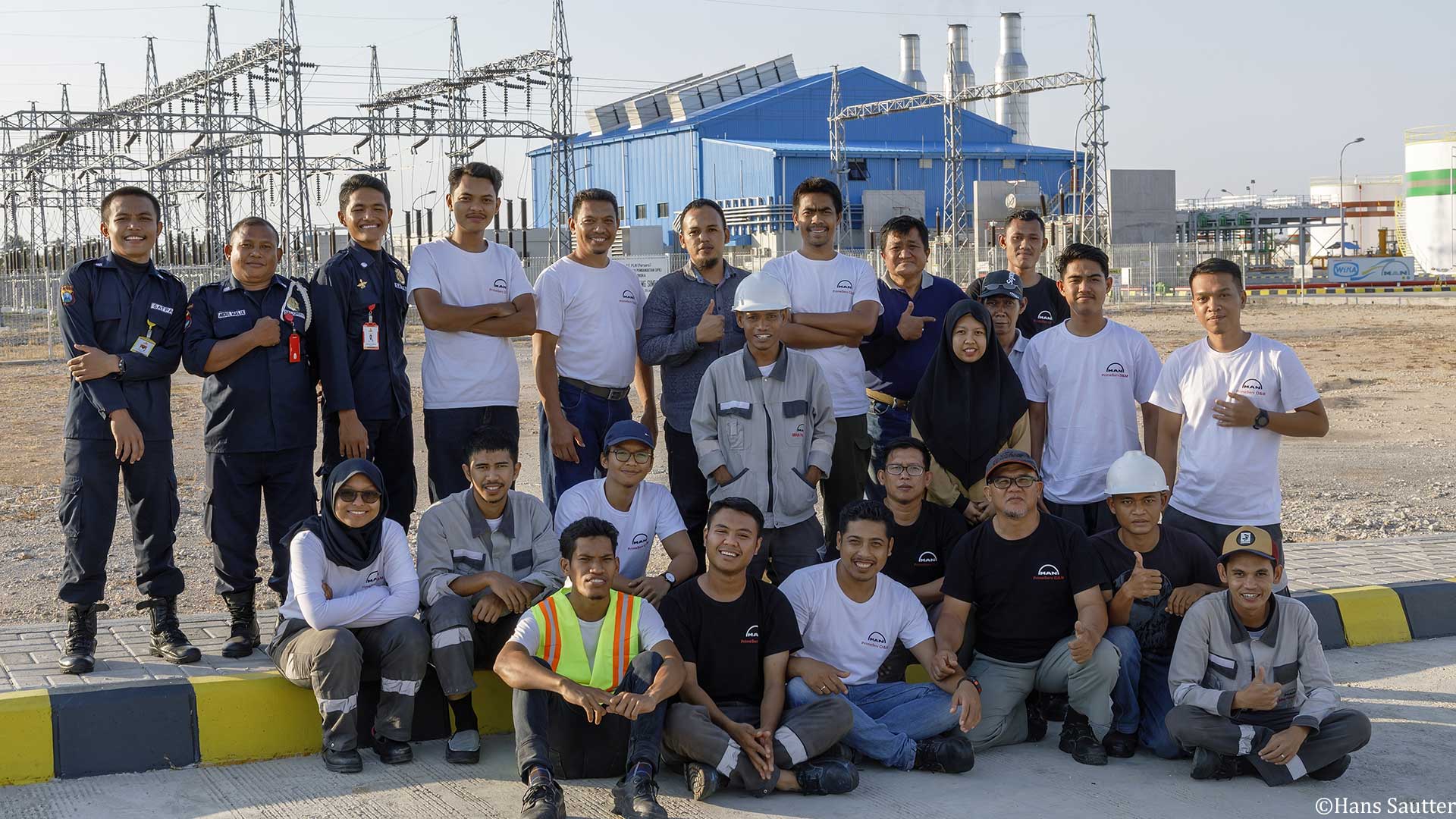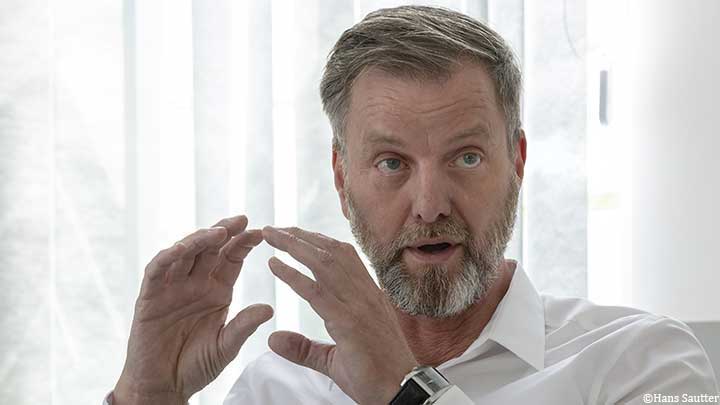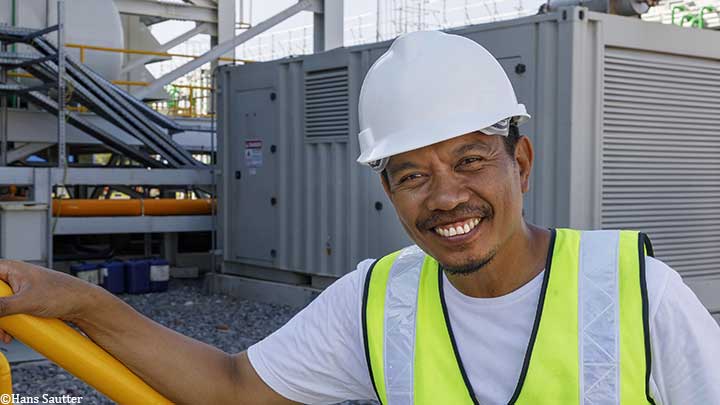MAN experts explain how to ensure a stable power supply on a remote Indonesian island
Reliably supplying over 6,000 inhabited Indonesian islands with power is a huge challenge. But the Indonesian government is aiming to ramp up power capacity to even the remotest regions with three new power plants built and operated by MAN Energy Solutions. So what does it take to run smooth operations far off the beaten track?
Text by Glenn van Zutphen, photographs by Hans Sautter
The lights are on in East and West Tenggara, the Indonesian provinces where MAN Energy Solutions recently commissioned three dual-fuel power plants in the cities of Bima, Sumbawa and Maumere. The plants, which took just two years to build, can run on liquid fuels as well as liquefied natural gas to provide 140 megawatts of power to over one million people across the regions.
They’re also the workplace for around 120 local workers. “We start with local talent and keep that policy in place,” says Henning Hansen, Head of O&M Project Execution. From the MAN office in the seaport city of Surabaya, Hansen and his colleague Philip Lutterodt, Head of Project Execution (O&M) Asia, both experts in setting up O&M Project teams from scratch, tell us what it takes to run successful operations in remote islands.
Three plants on two different islands, Sumbawa and Flores, 326 kilometers apart: Did the distance pose any problems?
Henning Hansen: This was the real challenge. There’s no problem starting up a power plant on the other side of the street – that’s a walk in the park – but to start off three power plants in places where you can’t contact people or be there yourself every day…Well, you need to rely on a good team and open communication.
Philip Lutterodt: And to add to that, there are over 300 different ethnic groups in Indonesia, each with its own cultural identity, and more than 250 distinct languages, spread over 6,000 inhabited islands. You have to remember that Indonesia is a tribal society. The challenge is to take people with disparate identities, different levels of education and make them a coherent team.

Teambuilding: The employees at the new dual-fuel power plant in Sumbawa, Indonesia, attend an ongoing training program at the PrimeServ Competence Center in Surabaya.
So how did you go about building the team?
Hansen: We divided the skill sets into different areas – one area being highly-skilled labor that we knew from the beginning would be pretty tough to attract to remote islands. So we separated it out into three levels: the skilled labor we can attract to the plant and two support levels for complexity in maintenance and operations. Then you can bring in outside talent to support the employees on-site. For example, we have an employee from another installation in Cuba who’d been with us already for three years. He’s extremely skilled – a week here and he was fully up and running. He’s a kind of overall guru here in operations, control and maintenance.
How much technical expertise did you need to bring in from outside?
Lutterodt: We only brought in a small number of people, one or two per plant, and then we have been phasing out that team to give the local staff a free hand. This is the most sustainable way forward. Our last non-local staff member left in December 2019. Here at Surabaya we can still monitor the plants, but our local group of about 40 workers at each plant are capable of running daily operation and first-level maintenance.

“The real challenge,” says Hansen, Head of O&M Project Execution for MAN, was starting three power plants at the same time on two remote islands: “You can’t contact people or be there yourself every day.”
Hansen: We don't have high-level experts from Germany or whatever country sitting in this power plant. We start with local talent and keep that policy in place. It’s just a matter of training.
What kind of people are working at the plants?
Lutterodt: Well, there’s a mix of employees. Some from Sumbawa and Flores were hired as a result of recruiting in nearby villages, and some worked on the plant’s construction and were hired once it was completed. The higher-skilled employees, came from Java, Lombok or Bali and had previous experience working in power plants there. Sirajuddin, the plant manager in Sumbawa, for example, comes from Celebes and had worked in a similar plant in Sumatra before.
There are also people working common jobs like driving, gardening, office administration – because it’s a vocation they’ve learned – and whether it’s a secretary or somebody with an economics degree working in the administration building, more than 60 percent are from the nearby local community. The other 40 percent come from other parts of Indonesia, but are qualified within the energy industry.
We'll continue to grow our own people and develop them to take over the next plants.
You mentioned earlier that it was “just a matter of training” to promote local talent. Where does that training take place?
Lutterodt: We have a PrimeServ Competence Center here in Surabaya. During ongoing year-long program all trainees receive instruction in analytical problem solving – for example, where do you start first if an alarm bell rings? They receive safety training, the opportunity for hands-on practice with dummy equipment and are well-versed in what to expect for their final certification.
We prepared about thirty people here for the Competency Certificates required by Indonesian law to operate an O&M business license. Our instrumentation and control specialists in the SaCoS control automation system get their training in our PrimeServ Academy in Augsburg, Germany.
With a good team in place, what would you say your maintenance challenges are now and going forward in years to come?
Lutterodt: Logistics. The aircrafts that fly to the islands– the ATR 72 turboprop – can’t take much load, so the larger items go by truck and ferry. Shipping from here to Sumbawa is approximately three days, to Bima four days, and to Maumere five or six days. It's better to consolidate and control everything here and then ship it out. When it's for plant maintenance, we know how long it will take.
-asia--man-energy-solutions.jpg?sfvrsn=688108bb_0)
Lutterodt implemented intercultural training for plant managers and key positions to learn about Western and Indonesian culture and attitudes.

Sirajuddin, the plant manager, is part of the “local talent”, coming from Sumatra where he had experience working in another plant.
MAN is set to build power plants for six more islands in Indonesia. Will you do anything differently?
Lutterodt: We'll continue to grow our own people and develop them to take over the next plants. We’ll have our own specialists, Indonesians, right here in the country. Plus we have a good administration, we have good processes, we have systems, we have communication, we have IT – all the things that can take so much time away from what you’re supposed to do are part of foundation building. We’re about 90 percent complete with that and ready to expand business here in Indonesia.
Hansen: We’d also like to focus more on our people here in Surabaya and become more diversified in supporting power plants around us. As Philip said, Logistics is an issue because of island hopping, and if we get even further spread out in the basin of Indonesia, then even just getting spare parts out there is going to be an issue.
How have locals responded to the plants so far?
Lutterodt: The plants in Sumbawa and Bima are almost at their limit. The third plant has to jump into peak time, but energy demand is rising. At a hotel in Bima where we always stayed, the manager said, “Oh, you guys finished your project.” I said, “How did you know?” “Well, no more blackouts!”
About the author
Glenn van Zutphen is a journalist and radio talk show host based in Singapore.
What does reliable electricity mean to islanders in Indonesia’s East and West Tenggara?
Explore more topics
MAN Energy Solutions is now Everllence.
We have adopted a new brand name and moved to a new domain: www.everllence.com. This page will also be relocated there shortly. We are working on shifting all pages to www.everllence.com.
